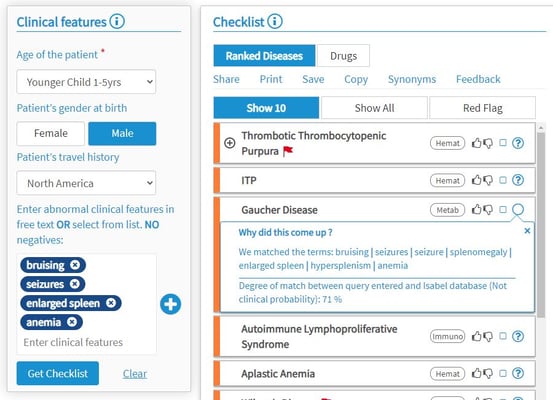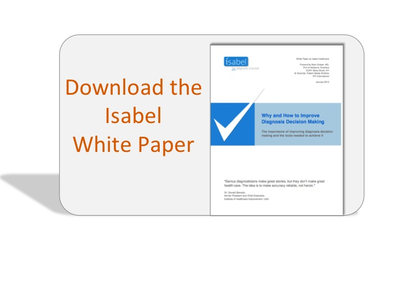- Privacy Policy
- Terms & Conditions
- Contact us
- ©Isabel Healthcare 2025
Diagnostic Decision Support: perfect for rare disease awareness
Rare diseases have become big business. Orphan drugs for rare diseases are expected to account for 19% of all worldwide prescription drug sales by 2020.
The main reason for this is a law passed in 1983 in the US, in Japan in 1993 and in the EU in 2000. These laws basically give financial incentives to pharmaceutical companies to develop drugs for rare diseases.
Broadly speaking, rare diseases are defined as populations affected by the disease of less than 200,000 to 250,000.
The median cost for an orphan drug is 19 times higher than for a non-orphan drug. It’s not unusual for orphan drugs to cost $300,000-$400,000 per patient per year.
Although clearly very attractive for pharmaceutical companies, one of their key challenges is how to find people with these rare diseases. The traditional broadcast methods of TV and bill-board advertising can be blunt and are usually ineffective for finding people with rare diseases. Since around 1 in 50,000 people will have the disease only a tiny fraction of those watching are likely to respond to the advertising.
The many consultants advising pharmaceutical companies are starting to suggest changing their game for disease awareness from a broadcast model to a targeted one.
For generations healthcare has depended on the broadcast method of dispersing knowledge so this will be a challenge. Mountains of new knowledge and guidelines are published everyday relying on the clinician to find what’s relevant and remember it when needed-often many years later!
Diagnostic decision support systems, like Isabel, can play a very useful role here as they effectively deliver relevant knowledge when its needed.
Let’s look at an example of, say, Gaucher Disease, which affects around 1 in 100,000 people. Most GP’s will never have seen a case or may see a case every 5-10 years. Although there is plenty in the literature about Gauchers and its associated typical presenting symptoms, it is extremely unlikely that the average GP will think about it when their patient presents. As a result many patients are not correctly diagnosed for several years after they first present, simply because nobody thought about Gauchers and had it in their differential diagnosis.
If the GP had access to Isabel they could enter their patients symptoms as per the screen shot below and see that Gaucher Disease appears appropriately for the combination of symptoms entered. This would prompt the GP to start thinking about Gaucher along with the other diseases suggested.

If the GP was not familiar with Gaucher Disease he/she could then click on the diagnosis and see knowledge from various respected evidence-based resources. At this point educational information about the drugs available to treat Gaucher could be made available.
This example shows how online diagnostic decision support systems like Isabel could help with identifying and recognising rare diseases earlier- a new paradigm in disease awareness.

Jason Maude
Jason is the CEO and Co-founder of Isabel. Prior to co-founding Isabel, Jason spent 12 years working in finance and investment banking across Europe. His daughter, Isabel, fell seriously ill following a misdiagnosis in 1999 and this experience inspired Jason to abandon his city career and create Isabel Healthcare Ltd.
Subscribe Here!
Recent Posts
Isabel DDx Companion with ChatGPT Integration - to help you diagnose even faster
At Isabel Healthcare, we’ve always been driven by one goal: to make clinical reasoning faster,..Virtual Triage: Do more questions lead to better patient outcomes?
One of the common misconceptions related to virtual triage / symptom checker tools is that the more..List Of Categories
- Differential Diagnosis Decision Support
- Differential diagnosis
- Symptom Checker
- Symptoms
- Medical Error
- Patient Disease Information
- Disease
- Clinical Decision Support
- Diagnostic Decision Support
- Isabel 1 Minute Read
- Diagnosis Error
- Diagnosis Skills Cases
- Healthcare Informatics
- Clinical Reasoning
- Evidence-based Medicine
- Medical Education
- Patient Engagement
- Symptom Triage
- Nurse Practitioner Education
- Nursing Decision Support
- Partnership
- Public Health
- COVID-19
- EHR
- Patient Empowerment
- Patient Safety
- rare disease

Start your FREE Trial today
Try the Isabel Pro DDx generator for 30-days - no payment card details required.




